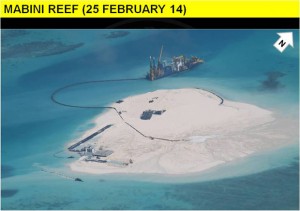China turning reefs into ‘artificial islands’ for ‘dominance’–expert

The DFA released photo of the Mabini Reef showing China’s reclamation activities on the disputed area. DFA
MANILA, Philippines – China wants to “establish dominance” in the West Philippine Sea (South China Sea) and it is doing so through land reclamation of reef to turn them into artificial islands, a maritime law expert said.
The reclaimed island will have no bearing on the arbitration case filed by the Philippines against China before the International Tribunal on the Law of the Sea (Itlos), Jay Batongbacal, director of the University of the Philippines’ Institute for Maritime Affairs and Law of the Sea, said in a text message to INQUIRER.net.
“The making of these [artificial] islands does not at all affect the legal merits of the [Philippines’ and China’s] positions,” Batongbacal said.
“These activities are significant for their practical value/implications to the ability of China to establish dominance in the South China Sea, not the nature or legality of the claims,” he said.
The Department of Foreign Affairs (DFA) previously said that China’s land reclamation would “jeopardize” the arbitration case filed by the Philippines before the International Tribunal on the Law of the Sea (Itlos) because it has changed the characteristic of the maritime feature.
DFA Secretary Albert del Rosario has expressed his intent to go before the Association of Southeast Asian Nations (Asean) to call for a moratorium on all activities in the West Philippine Sea, particularly the reclamation activities.
DFA previously released a series of aerial photographs showing Chinese ships conducting land reclamation at the Mabini Reef (Johnson South Reef).
China is also believed to be starting reclamation on several other reefs.
According to Article 60 of the United Nations Convention on the Law of the Sea (Unclos), which is regarded as the “constitution of the seas,” artificial islands are not entitled to any maritime territory.
“Artificial islands, installations and structures do not possess the status of islands. They have no territorial sea of their own, and their presence does not affect the delimitation of the territorial
sea, the exclusive economic zone or the continental shelf,” Paragraph 8 of the article says.
The same article also says that a particular country can construct artificial islands only within its exclusive economic zone (EEZ).
The artificial islands being constructed by China in the Spratly Group of Islands are around 150 nautical miles west from the Province of Palawan and more than 550 nautical miles to the nearest landmass of China which is the Hainan province.
Batongbacal said that the artificial islands would not affect the arbitration case against China before the Itlos.
“At best, the artificial islands themselves might be treated similarly with vessels under a foreign flag, and are entitled only to a 500-meter safety zone for purposes of navigation. But they do not affect the legal status of their location or the surrounding maritime areas,” he said.
China, through the nine-dash line, claims nearly the entire South China Sea, including parts of the Philippines 200-nautical mile EEZ.
RELATED STORIES
Singapore PM: Might not right in territorial disputes
West Philippine Sea
For comprehensive coverage, in-depth analysis, visit our special page for West Philippine Sea updates. Stay informed with articles, videos, and expert opinions.